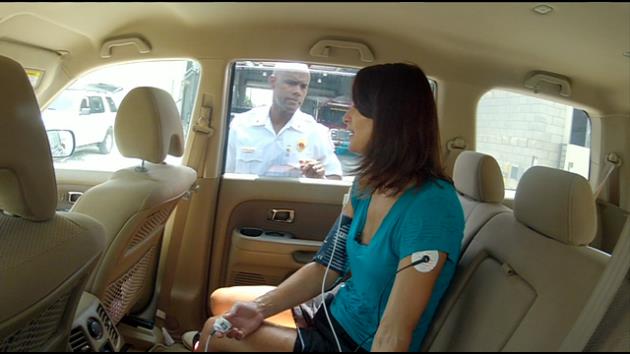It happens every summer, unthinkable tragedies occurring when children are left in locked cars. For kids, feeling the heat can be deadly, as 7’s Nicole Linsalata shows us in tonight’s special report, “Feeling the Heat.”
WSVN — We’ve seen it happen over and over again.
A 3-month-old baby found dead from the heat inside her grandmother’s car in Miami. A 1-year-old girl dead in a car in Miramar. A 2-year old dying outside a daycare center in Delray Beach. So far this summer, 14 children dying across the country after being left in hot cars.
Miami Fire Rescue Lt. Ignatius Carroll: “Nationally, you have 30 to 40 children that die as a result of heat-related deaths, most of them being inside of a car.”
City of Miami Fire Rescue crews answer emergency calls like these and know first hand what happens to kids in those cars.
Miami Fire Rescue Lt. Mark Moore: “The body is basically assaulted, and it’s being assaulted by heat.”
Recently, they worked with 7News to show exactly what happens to the body in extreme heat.
Lt. Ignatius Carroll: “What they’re going to do is check your vitals.”
Paramedics hook me up to monitors, checking my heart rate, oxygen saturation levels and blood pressure.
Lt. Ignatius Carroll: “We’re going to monitor you with our life pack that’s going to be outside the vehicle.”
Then, it’s time to get in the car and shut the door. We start the timer. To start, it’s 91.6 degrees outside. Inside the car, just turning off the A/C, it’s a nice, cool 63 degrees, but that soon changes.
Nicole Linsalata: “It’s only been about five minutes, and the temperature already has jumped up almost 20 degrees.”
And my blood pressure goes up as well. And at 10 minutes in, it’s up even more.
Lt. Ignatius Carroll: “Nicole, how you feeling?”
Nicole Linsalata: “I feel fine, but I am drenched.”
I’m drenched, because now the car feels just like a sauna.
Nicole Linsalata: “It’s 104.2 degrees. We’ve been in here 18 minutes, and I am sweating profusely. I’m sure I’ve lost a lot of fluids.”
Lt. Mark Moore: “The longer you stay in that type of environment, your heart rate becomes elevated. You become tachycardic, you become diaphoretic.”
That means my heart and perspiration rates are heading into the danger zone.
Lt. Mark Moore: “Then what follows is heat exhaustion and then heat stroke.”
And remember, kids are even more susceptible to the heat.
Lt. Ignatius Carroll: “A child’s body is not able to compensate heat as well as an adult. Their body heat goes up three to five times faster than what an adult does.”
Add in a child’s panic — crying, thrashing around — and you start to understand how serious this situation can be.
Nicole Linsalata: ‘It’s hard to imagine someone much smaller than I am going through this.”
Twenty-five minutes in, it’s 110 degrees in the car. My blood pressure is 142 over 80; my pulse is 112. Then, minutes later, my blood pressure suddenly drops, trying to compensate. Not a good sign.
Lt. Mark Moore: “Once your body starts compensating, it doesn’t take long for it to go off the deep end.”
Thirty minutes in, my pulse rate is up to 120, and i’m running a low-grade fever.
Nicole Linsalata: “Right now, the temperature has gone up 46 degrees, almost 50 degrees in 30 minutes.”
Lt. Mark Moore: “Probably going to recommend that we end it very soon.”
Paramedics pull the plug. The temperature is 116 degrees inside the car.
Lt. Mark Moore: “For a child, 37 minutes in a hot car like that is a lifetime.”
Lesson learned. They take me inside to rehydrate and cool down.
Lt. Ignatius Carroll: “And this can happen to any family. I think this is one of the most preventable deaths that we have here.”
Yet it still happens. Children left in cars, sometimes by accident, other times on purpose. And even with the advantage of being an adult in good health, it took me some time to cool down. A chance that too many children will not have.
Nicole Linsalata, 7News.

